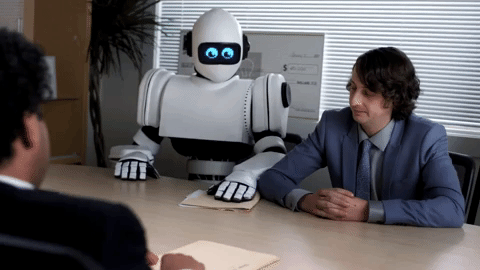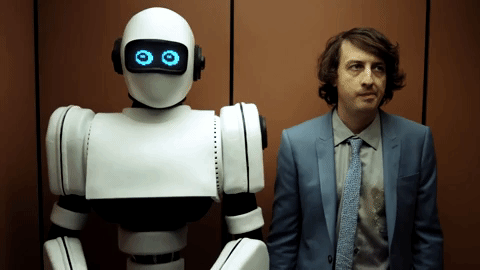
How did we experience the future of work with a robot?
Our new teammate Kaito is working 200 hours a week. But hey, he’s a robot – he doesn’t mind. Let me introduce Kaito, describe some of his tasks, and explore what it means for the future of work.
Today, I’m very excited to introduce our new teammate: Kaito AI. Unlike you and I, he isn’t a human being: he’s a robot. Over the summer of 2017, we created Kaito so he can help the team by taking over a number of tasks. For the last year or so, we’ve been living in the future of work!
Administration sucks, and no one likes to do it. So so we decided to put a robot to do it… We want to spend our time taking care of humans, clients or teammates, not files and formalities.

What does Kaito do?
Kaito actually does a lot. No one likes to do administrative work at Enigma, so we have always used services and tools to help out. Kaito is on a whole new level, though!
CRM sanity check
Every night, he runs a sanity check of our CRM contacts: over 8000 contacts are checked in a couple minutes! While most companies run through hell once or twice a year when they have a big marketing action coming up (usually for Christmas cards and gifts), we’re always up-to-date with our clients, leads, partners, friends and other professional contacts.
Weekly project report
Every week, Kaito puts together a report for every active client. In this report, there’s an overview of projects tasks: what was achieved in the week, what’s late, what’s on standby, and what still needs to be done. There’s also a view on worked hours against budget, as well as an invoice recap: what’s already paid, what’s late, what’s still to be invoiced.
This report, which we previously issued only every other week, is much appreciated by our clients who are always up-to-date with the project progress. It helps them report to their management and it’s a great way to expose problems or any kind of issue early enough so it never gets critical.
Sending invoices and late payment reminders
Every entrepreneur knows how important cash-flow management is. And every teammate knows how time-consuming it is to create an invoice and send it, to check whether an invoice has been paid, or to write and send a gentle reminder. Keeping a constant eye on those clients in the following weeks also requires much effort.
Now Kaito takes care of everything. The minute an invoice is late, he will send a gentle reminder to the client. As soon as a payment is made, he’ll update the teammate in charge of the client. It’s really a great help.
Calling for help for his teammates
It’s not only about admin. Kaito also checks how much work is assigned to any teammates. Whenever anyone has too much, he calls for help. This is great because then the person who is overwhelmed doesn’t feel guilty or reluctant to ask other people for help.
There are a lot of other things that Kaito does as well, such as organizing internal meetings, sending satisfaction surveys, pulling an alarm signal every time a client is not 100% satisfied, or sending witty messages on Slack, our internal chat system. The list goes on and on and we give him more tasks every now and then.
In total, the estimated work Kaito crushes in a week is around 200 hours. But hey – he’s a robot so it’s not a problem. He loves it: he was created exactly for this.

How did we create Kaito?
Kaito was created in-house by our own automation mastermind Vincent Ghilione. He’s basically a link between various online and cloud-based services we use to run Enigma: invoicing system, CRM, messaging apps, task manager, bureautic suite, and so on.
If needed, this is living (well, more or less living) proof that working with standard, off-the-shelf and connected solutions is much more efficient than with their proprietary, custom and locally hosted counterparts.
Today, there are APIs and connectors all around. You can achieve great things without a single line of code, provided you work with the right tools. Based on this, you only need a bit of magic and some specific skills to turn great automations into a real teammate – just like we did.
But once again: it start with the right tools.

Why “Kaito”?
At his core, Kaito is only a set of automated processes and connections between various services. So why are we making such a fuss about it? We could have stopped there and left it be a dumb machine.
But then, it would only be a part of “the System”. Something that works and is so deeply integrated to our processes that we wouldn’t think about it anymore. We could forget about it entirely.
Instead, we chose to treat it like a real teammate. We picked a name that reminds us of the Japanese cartoons we watched on TV when we were kids. We chose a visual appearance to make Kaito more real. And we developed a whole personality. A tone of voice, a set of behaviors, dreams and role models.
We gave Kaito all of this so he can become a part of our culture. We created Kaito the way he is, so that our human teammates can interact with him. He will help them and they will say thanks. They will ask questions and he will answer in his own, witty and sometimes strange way.
He will occasionally post some inspirational quotes, make jokes, react to other messages with an emoji. We did all this so Kaito and automation are a real part of our team, in a way that everyone knows what happens. Ultimately, it’s not just another part of “the System”, Kaito is another team member. One we are very proud of and thankful for. We are also proud that our company culture takes a step into the future of work.

What does Kaito mean for the future of work?
Ever since we launched Kaito, we have been asked some strategic questions. First by our own team, then by the first clients who we offered to beta-test Kaito, then by all the other people and journalists who heard something about him.
If it can be automated, it will be. – Enigma Credo
Of course, Kaito has taken us a step forward into the future of work. We knew it was coming, we knew the technology was ready, so we decided to test it out for ourselves.
How are humans feeling about him Kaito?
It’s less obvious than you would imagine.
At first, there were very mixed feelings among the team. Some were thrilled to leave out some boring tasks. Some were curious and eager to explore this new territory. And some others were quite skeptical or even afraid. There were lots of questions and lively conversations.
Will I still be useful once Kaito is here? Is my job so dumb that a robot can deal with it? Will Kaito save me time or waste my time? Will Kaito really work? How will I need to change the way I work so Kaito can help? How are clients going to feel about Kaito?
Almost one year in, no one wants to go back. Kaito is so useful that everyone wants to keep him!
Will Kaito steal work from humans?
The plain answer is no.
Our credo says: “Always remember to be human.” Business is a human matter and it will never change. Our plan is not to replace humans with machines. It will never be.
Rather, our plan is to use machines for dumb and repetitive tasks that humans don’t like to do. This way, we can save time that humans can use for tasks only they can perform: take care of other human beings – clients, partners, teammates, leads or any other person we meet on the road.
Kaito doesn’t steal work from his human teammates. He allows them to be more human, because he performs tasks that we would not feel comfortable asking of a human teammate. Asking flesh and blood to check 8000 contacts a day would sound like a punishment, and asking them to spend 85 hours a week following payments and sending reminders is neither interesting nor fulfilling work.
This is the way we see things: we value quality in our work, our relationships, and the management of this company. Yet we know quality takes time, because you need to be dedicated and thorough. What usually happens is you accept to slightly lower your quality expectations so that what you do is viable – this is the reason why we used to issue our client reports only twice a month.
Thanks to Kaito and robots, some tasks that were impossible are now possible. And thanks to Kaito, our human teammates have more time to focus on things that really matter: run business projects and relationships in a more human way.

Will we sell Kaito to other businesses?
This one we didn’t see coming.
It was not our initial plan. We really created a tool to help us work better and experiment technology, period. But this question comes often, so we are considering different ways of making it possible for other companies to get their own robot teammate and join the future of work.
Of course, Kaito was custom-designed to help Enigma. He connects to our tools. He performs tasks from our way of doing things. He speaks in our tone of voice. He’s our teammate.
Kaito works fine for us, but other companies might need Albert, or Carol, or whoever else is suitable for their own way of working.
Our experiment with Kaito brought us a lot of learnings. We are convinced that a lot of businesses out there would benefit from a similar teammate to support their activity and move toward the future of work. One thing is sure, though: Kaito is not a one-size-fits-all solution. It will never be sold as a standard service. But we can certainly help others create their own robot.
Actually, we’d be thrilled to do so.